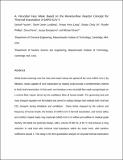A virucidal face mask based on the reverse-flow reactor concept for thermal inactivation of SARS-CoV-2
Author(s)
Faucher, Joseph; Lundberg, Daniel James; Liang, Xinyao Anna; Jin, Xiaojia Cindy; Phillips, Rosalie; Parviz, Dorsa; Buongiorno, Jacopo; Strano, Michael S.; ... Show more Show less
DownloadSubmitted version (1.600Mb)
Open Access Policy
Open Access Policy
Creative Commons Attribution-Noncommercial-Share Alike
Terms of use
Metadata
Show full item recordAbstract
While facial coverings reduce the spread of SARS-CoV-2 by viral filtration, masks capable of viral inactivation by heating can provide a complementary method to limit transmission. Inspired by reverse-flow chemical reactors, we introduce a new virucidal face mask concept driven by the oscillatory flow of human breath. The governing heat and mass transport equations are solved to evaluate virus and CO2 transport. Given limits imposed by the kinetics of SARS-CoV-2 thermal inactivation, human breath, safety, and comfort, heated masks may inactivate SARS-CoV-2 to medical-grade sterility. We detail one design, with a volume of 300 ml at 90°C that achieves a 3-log reduction in viral load with minimal impedance within the mask mesh, with partition coefficient around 2. This is the first quantitative analysis of virucidal thermal inactivation within a protective face mask, and addresses a pressing need for new approaches for personal protective equipment during a global pandemic.
Date issued
2021-02Department
Massachusetts Institute of Technology. Department of Chemical Engineering; Massachusetts Institute of Technology. Department of Nuclear Science and EngineeringJournal
AIChE Journal
Publisher
Wiley
Citation
Faucher, Samuel et al. “A virucidal face mask based on the reverse-flow reactor concept for thermal inactivation of SARS-CoV-2.” AIChE Journal (February 2021): e17250 © 2021 The Author(s)
Version: Original manuscript
ISSN
0001-1541